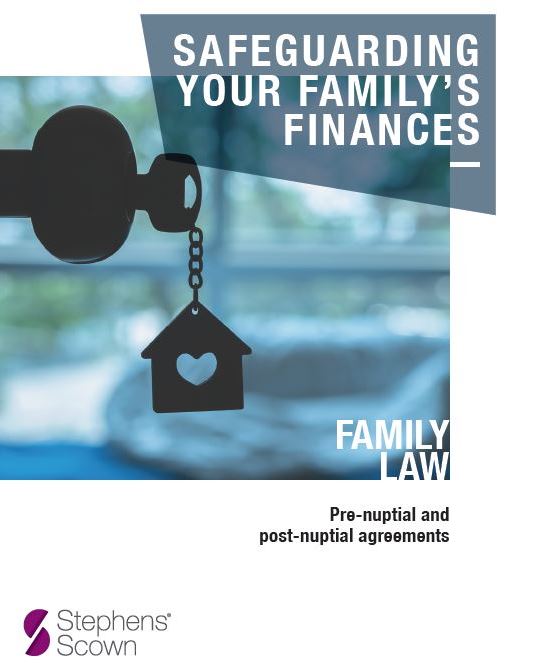Claims Against Trusts
When resolving finances on divorce, trust assets are a resource that should be taken into consideration. Trust interests must be disclosed, and in some cases the court has the power to vary a trust arrangement if this is necessary. Claims against trusts is a complex area of Family Law, so seeking expert advice early can be key to achieving the best outcomes.
What is a claim against a trust?
There are many and varied types of trust. Some make express provision for the intended beneficiaries. Others are discretionary in nature and there can be significant arguments about the extent of a person’s interest.
To be capable of making a claim against a trust, the court will need to be persuaded that the trust is nuptial in nature. Whether a trust is nuptial will be case specific. Consideration would need to be given to many factors including:-
- The timing of the creation of the trust;
- The history of distributions to assess the extent of likely future provision;
- The number and identity of the other beneficiaries of the trust;
- The extent to which the trust provides for the continuing provision for both or either of the parties to the marriage.
If the court is satisfied that a trust is nuptial, and that they therefore have the power to vary a specific trust, the next question will be the extent to which the court should vary the trust. In doing so, the court will need to take into account:-
- The usual section 25 factors as set out in the Matrimonial Causes Act 1973
- The overall fairness of varying the trust
- The court should not interfere with the trust further than is necessary to achieve the purpose and do justice
- The impact the variation will have on third parties
- The effect on any children
In undertaking the assessments set out above, the court and parties are likely to need to see all the trust documents, accounts, and any letters of wishes of the settler.
The court may then encourage trustees to make provision available to a divorcing trust beneficiary, so financial provision for their spouse awarded in the divorce can be funded. If judicial encouragement is not successful in persuading the trustees to make provision for a spouse with a claim against a trust, the court may be able to vary the terms of a trust without the agreement of the trustees.

How to Start a Claim Against a Trust
Making a claim against a trust during a divorce is not straight-forward and there can be significant legal costs involved. It is therefore important to understand as soon as possible whether making a claim in your situation is reasonable, necessary, proportionate and likely to be successful, taking into consideration all the circumstances. If a claim against a trust is considered proportionate and likely to be successful, you should:-
- See if an agreement can be reached on an amicable basis by putting the Trustees on notice of the claim;
- Invite the Trustees to the Trust to be joined as a party to the financial proceedings on divorce;
- If an amicable agreement cannot be reached, your application for the resolution of the finances on divorce should include reference to the Trust that you are asking the Court to vary – it may be that if you do not have sufficient information about the Trust until there has been an exchange of financial disclosure with your spouse that you cannot make an application to vary the Trust until a later stage in the financial proceedings – you should take advice about when to make the application;
- The application to vary the Trust should be served on the Trustees to the Trust;
- The Trustees may decide to attend the first directions appointment to make submissions to the Court about whether they consent to be joined as a party to the proceedings, and if they should be joined by the Court to the proceedings;
- Once the Trustees have been joined to the proceedings, the starting point is to have disclosure of the Trust documents. Decisions can then be made about whether to proceed with the claim against the Trust, and if so, what is being sought.
Each case will be different, and will depend on the circumstance of the case including the resources available outside the Trust, and the type and age of the Trust. Claims made should be proportionate and therefore bespoke advice should be sought from experienced family solicitors.
Trust Claim Legal Advice
It is important to take advice from an experienced lawyer when looking at whether to make a claim against a trust. Claims against trusts can be very complicated and therefore it is important to take advice from someone who has experience in the field – they should know how to navigate the complexities, understand the procedure to be taken and the powers available to the matrimonial court. This advice should be taken as early as possible so that the correct procedure is followed, and the merit of whether a claim against a trust is likely to be successful.
If the correct approach is not taken to a claim against a trust in matrimonial proceedings, it is possible that the unsuccessful party will be ordered to pay the trustees costs. On that basis it is very important to take advice from someone experienced at an early stage to ensure that it is a worthwhile risk taking in the context of a divorce.
Taking advice early can also assist in reducing fees. If there is no need to make a claim against a trust, or it is unlikely to be successful, you can also save a considerable amount in fees in pursuing something which may not be proportionate. Conversely, if a claim against a trust in matrimonial proceedings is necessary, and likely to be successful, it is important that this is set out as soon as possible so that the appropriate procedure, and strategy can be employed – this can aid swift action and, in turn, lower legal fees.
We have significant experience in assisting clients to make claims against trusts in matrimonial proceedings and can advise you as to the merits and risks in your case.

Expert guidance for beneficiaries and trustees
We specialise in claims relating to trusts and can offer dependable advice to spouse beneficiaries or trustees if they are called upon to provide information to the court when a beneficiary gets divorced. This advice will concern the level of disclosure required, and its implications. Some trusts are offshore, and we have trusted contacts in foreign jurisdictions who can assist where needed.
In certain circumstances, where a trust is deemed ‘nuptial’, a court has the power to vary trusts or structures in the context of a divorce – and even to change beneficiaries to provide for a spouse. In such situations, other beneficiaries of the trust will need legal representation to ensure their interests are still considered. We can assist with this.
We can advise trustees and beneficiaries of the claims that can be made against the trust, the powers available to the court, and the likely outcome.
Our Experience with Claims Against Trusts
Our clients have the best Family Law team in Devon and Cornwall – as ranked by Chambers and The Legal 500, the two leading independent legal guides. The fact that we are also a full-service firm ensures our clients have access to a broad range of legal expert, including our experienced Inheritance and Trusts team, who can advise on the implications for divorcees who are trust beneficiaries, trustees who are called upon to provide information to the court, and other beneficiaries of an affected trust.
Claims against trusts are a complicated aspect to a divorce, and therefore it is important to take advice from an experienced law firm.

How can we help you
"*" indicates required fields
By pressing send and providing your details you are agreeing to our Privacy Notice.
Once you submit your enquiry we will forward to the correct legal team to get in touch as soon as possible.
Related Services
- Inherited and Pre-Marital Assets
- Pensions in Divorce
- Interim Maintenance
- Maintenance Agreements
- Financial Provision for Children
Downloads
Team Leader







